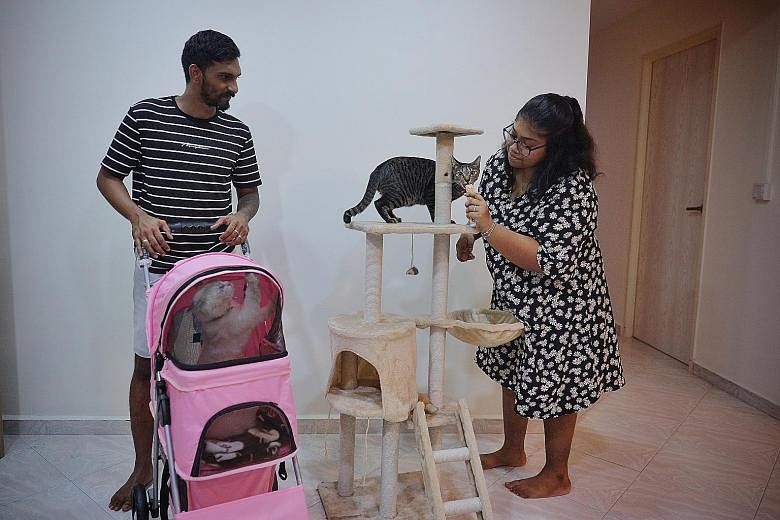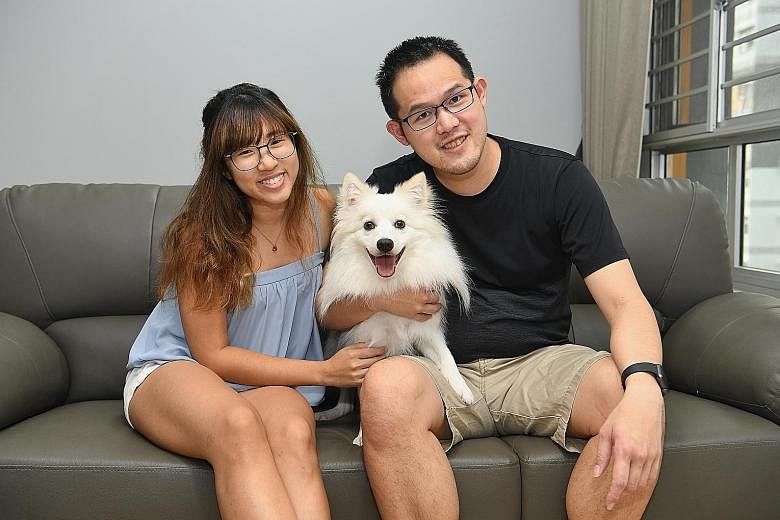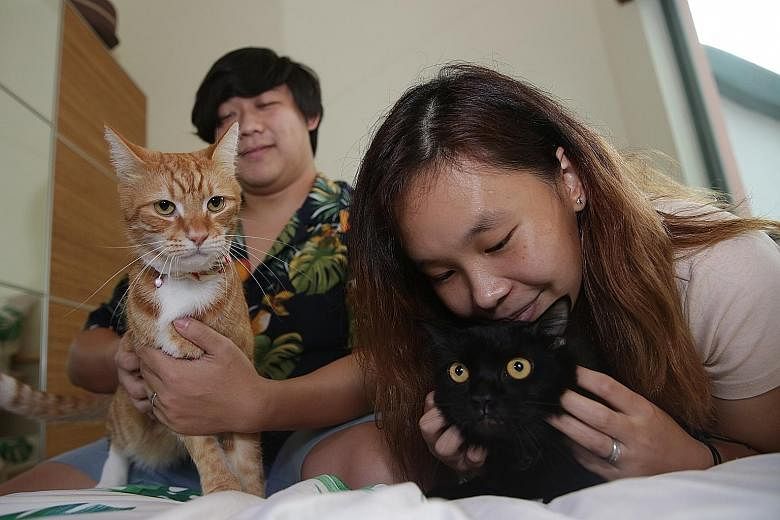When Ms Ho Si Ying met her future husband at the University of Tasmania in Australia, they bonded over a love of animals and music - as well as a conviction that they did not want children.
Today, the couple, now aged 26, share their Jurong home with three adopted cats and various tropical fish and remain happily child-free.
"I'm not sure how sustainable it is to bring more people into an already overpopulated planet," says Ms Ho, a freelance environmental science educator.
"We grew up with a love of the outdoors and animals. It's difficult to see a world in which we can raise our children that way... We have a strong belief that you need time to be alone in nature and talk to people face to face."
Her husband Eustace Chai, a medical devices consultant, chimes in: "Money can always be earned back. It's more about the quality of life you can provide for the kids. With (former United States president Donald) Trump, a potential World War III and climate change, it just doesn't look great."
There are other reasons too - Singapore's "results-oriented" schooling system and the couple's desire to have more time to themselves after caring for younger siblings while they were growing up.
Their three "furkids" have different personalities. Jack the tomcat loves attention. Fig, a dainty cat with a big appetite, flinches from the spotlight. Squid, who has black, luscious fur, likes to slouch.
"I think we won the lottery with these cats," Ms Ho says.
Besides the furry creatures, they have a community tank with golden pencilfish, red neon "paskai" rainbowfish, butterfly loaches, panda corys and amano shrimp. Another tank, a South-east Asian blackwater biotope, is home to glass catfish, kuhli loaches, sparkling gourami and mosquito rasboras.
Ms Ho and Mr Chai are far from the only millennial couple in Singapore who have decided to have furkids instead of human babies.
Others whom The Sunday Times interviewed cited a host of similar reasons for abstaining from parenthood, such as lower costs, more freedom and anxiety about the planet's future.
Married couple Beh Rey Lyn, 27, and Andrew Tang, 38, no longer want children. After Ms Beh had a miscarriage three years ago, the couple - who work in special needs education - decided to get a Japanese spitz puppy, Ori, which is now the centre of their world.
Ms Beh says: "One of my bigger reasons for not wanting children is that I see a lot of global crises I feel powerless to stop - for example, global warming or running out of fish supplies due to overfishing.
"I care a lot about such things and it's painful when I think how my children might not have a good world to live in if there will be famines and global extinctions.
"Most older people I talk to say I'm thinking too much, but it seems like it's a general consensus among people my age. I'm not confident bringing a child into a world where I can't protect or provide for him or her fully."
Singapore's total fertility rate fell to a historic low of 1.1 last year, in line with a general decline in birth rates in recent decades.
But it is "difficult to say with certainty", based on these figures, that a growing proportion of young Singaporean couples are indeed opting out of parenthood, says Associate Professor Kang Soon-Hock of the Singapore University of Social Sciences.
They might simply be delaying it, he adds. "For example, during uncertain economic times and with the spectre of job loss or in the midst of an unprecedented global pandemic, they may be taking the rational approach to delay parenthood and having their first child only when the time is right."
After successive delays, some couples may end up feeling that it is no longer feasible to have children, perhaps due to factors beyond their control, he says.
Discussions of the child-free lifestyle have been gaining traction around the world, not least on Internet forums such as Reddit. The subreddit r/childfree, up since 2009, has 1.4 million members.
Couples whom The Sunday Times spoke to say their pets have brought much joy to their lives, for instance, by teaching them the value of unconditional love.
Ms Beh and Mr Tang dote on Ori - taking him to air-conditioned cafes on weekends, giving him fresh meat and supplements and setting up not one, but two Instagram pages to chart his exploits.
"Most of our family think we are crazy," she says with a laugh. "Especially our parents and grandparents. They ask, 'When are you having kids?' We tell them that when a child comes, it comes. But for now, Ori is the centre of our lives."
Mr Tang says: "Ori has taught me much about sacrificial love - no matter how angry we are (at him), he still cuddles us, he still shows his love for us. He is, in many ways, my son. We look after each other."
Online pet store founder Angela Chong, 38, says "freedom and cost" were the main reasons she and her husband chose not to have children.
"Which, in hindsight, is ironic if you take into consideration how much time and money it costs us to give (our dog) Lumi the best."
Lumi, whom they found at a dog shelter, is prone to allergies. This prompted Ms Chong to hit the books, get certified as a pet food nutrition specialist and set up her store What The Fur?! to help other owners with pet nutrition.
"Caring for him has completely taken over our lives," she adds. "We figured that the commitment to a dog's life span would be timed just right with our retirement. But since having Lumi, we no longer want this commitment to end."
Newlyweds Govind Kumar, 25, and Ukshana Ambrossha, 24, dote on their adopted kittens Mimi and Zeus, whom they share their bed with and push in a pram in the park.
"We get judgmental looks, but we aren't bothered," says Mr Kumar, who works in the security sector as a loss-prevention officer.
Ms Ambrossha, a customer service officer, feels a stronger bond with animals than children.
She adds that the cost of raising children is also a huge deterrent.
"We just have standard, basic jobs - it's not viable for us. Pets are easier to maintain compared with human kids and the stress of bringing them up.
"We regard our pets as our kids."
Some people see children as "retirement plans" - but the idea is anathema to some of these millennial couples.
"It is something we completely disagree with," says Ms Ho.
Not spending money on kids would also mean more money for retirement, her husband adds.
"When our siblings have kids of their own, I think our place would be the go-to place for them," he says with a grin.
"Being old without kids, I think, will work out fine."




